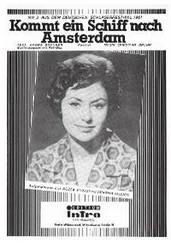No, we didn’t actually do anything. We did our work at the office, not all that well, for bosses we despised — except Bavink and Hoyer, who had no bosses, and who didn’t understand why we went in to see ours every day.
But we were waiting. For what? We never knew. Bekker said: “For the Kingdom of God.” At least that’s what he said once, without explaining any further. Bavink always talked about “the end that is also a new beginning.” We knew exactly what he meant and said nothing more about it.
II
That summer we met almost every night at Kees’s attic. Kees had decided he needed a “place” too. His place was the biggest and the easiest for all of us to get to. The neighbors didn’t like everybody going up and down the stairs every night. Kees’s father didn’t see the point of the whole thing. Now Kees’s father greets me very politely and calls me “Mister Koekebakker,” because he’s seen my name in the Handelsblad.
Bekker told Kees how he had to decorate it. They bought cheap wallpaper with a little flower pattern for three cents a roll and then glued it to the wall reversed so that the plain green backing faced out. Bekker wrote out a proverb in calligraphy and stuck it to the wall next to the door: “ J’ai attendu le Seigneur avec une grande patience, enfin il s’est abaissé jusqu’ à moi. ”*
I don’t know anymore where he got that from. Kees couldn’t read it. But Kees did contribute something, he made a shovel and Bekker managed to attach it to the wall pointing at the proverb. It wasn’t clear at first what it was supposed to mean, but later it turned out that Bekker wanted to go live on the heath someday and work a little piece of land, and never have to go back to the office. Bavink thought that was a good idea but was afraid Lien wouldn’t agree, and Hoyer preferred to hang around in bars.
Then we sat there and tore everything to pieces. Or almost everything. I remember that Zola and Jaap Maris came out more or less unscathed, maybe one or two others. Bekker read to us from Dante, he knew Ecclesiastes and the Song of Songs and the Book of Job by heart. It was very impressive. Not much of the outside world made it into Kees’s attic. The only window was almost shoulder-height off the floor; when you sat at the table, you couldn’t see much more than a sliver of sky, the color slowly draining out of it, and a few stars when it was dark out.
Paint? Who still knew how to paint nowadays, to hear Bavink tell it! You could palm anything off on people today, literally anything. I should paint a picture myself — he was talking about me, Koekebakker. He would tell me what to do. “Paint two horizontal stripes, one on top of the other, same width, one blue and one gold, and then put a round gold bit in the middle of the blue stripe. We’ll write in the catalog #666: The Thought, oil on canvas . And we’ll submit it under my name: Johannes Bavink, Second Jan Steenstraat, number soand-so, and we’ll price it at eight hundred guilders. Then you can just sit back and see everything they come up with. They’ll discover all sorts of things in there that you didn’t have the slightest idea of.”
Bavink was still very young back then. Later on, Lien came over too sometimes and made tea. One time, she scrubbed the floor and dusted everything off, but that was very unpleasant. It caused some embarrassment for Kees when she came over, because his old man had definite misgivings about the young lady, and Bavink was never the way we liked him when Lien was around. He was always giving her little squeezes and pinches. It was annoying.
Luckily he started to leave her at home before long, because he thought she was making eyes at me. Bekker said “Girls, they’re not worth it” and puffed on his clay pipe with especial satisfaction the first time she didn’t come. And that evening it was really nice too. We sat for hours in the dark. The lamp got fainter and fainter, then went out. We just stayed there sitting and smoking, for hours. Every once in a while someone said something. Bavink decided that painting was the dumbest thing anyone could do. Kees didn’t understand anything, as usual. “You have to just sit quietly and stay like that,” Bavink said, and looked up at the sky. A big greenish star twinkled. “You have to just sit quietly and stay like that and long with all your might, without knowing what for.” He filled a fresh pipe.
III
It was a strange time. And when I think about it, I realize that that time must still be happening now, it will last as long as there are young men of nineteen or twenty running around. It’s only for us that the time is long since past.
We were on top of the world and the world was on top of us, weighing down heavily. Far below us we saw the world full of activity and industry and we despised those people, especially the important gentlemen, the ones who were always so busy and so sure they’d gotten pretty far in the world.
But we were poor. Bekker and I had to spend most of our time at the office and do whatever those gentlemen said, and listen to their ridiculous opinions when they talked to each other, and put up with the fact that they thought they were much more clever and capable than we were. And when they thought it was cold then all the windows had to be shut and in winter the lights had to come on much too early and the curtains had to be pulled shut so we couldn’t see the red sky and the twilight in the streets and we had no say in it at all.
And we had to live on streets that were too narrow, with a view of the oilcloth curtains across the street and the tasseled fringe and the potted aspidistra with an impossible flower on top.
Oh, we took our revenge, we learned languages they had never even heard of and we read books they couldn’t even begin to understand, we experienced feelings they never knew existed. On Sundays we walked for hours on paths where they never went, and at the office we thought about the canals and the meadows we had seen and while they ordered us to do things that we didn’t see the point of we thought about how the sun had set behind Abcoude on Sunday evening. And how we had thought our way through the whole universe, without words; and how God had filled our head, our heart, and our spine, and how stark raving mad they would look if we told them about it. And how, with all their money and their trips to Switzerland and Italy and God knows where else and with all their clever hard work, they could never feel such things.
But still, they had us in their power, they confiscated the greater part of our time, they kept us out of the sunshine and away from the meadows and the seaside. They forced us to constantly fill our thoughts with their incomprehensible business. Even though that only went so far. They chewed us out; at the office we were totally insignificant. “Ah, Bekker,” they said to each other. The gentlemen had been well brought up; the woman on the third floor said “That harebrained idiot,” but the gentlemen were too well brought up for that. And they were bright, much brighter than the woman on the second floor, whose husband was a lamplighter, a good job that didn’t need much education. My boss asked me if I wrote poetry by any chance. Bekker thought that a man like him shouldn’t utter the word poetry , shouldn’t be allowed to. “What did you tell him?” I hadn’t said anything, I only looked at his face and saw what a thick skull he had and I thought: “He doesn’t know who he has standing here in front of him, he hasn’t got the brains.” And they paid us badly, the gentlemen did.
IV
And we were in love. For months Bekker went out of his way to walk down Sarphatistraat every morning. He was in love with a school-girl of seventeen or so, and he walked fifty steps behind her or on the other side of the street and he looked at her. He never knew her name, never said a word to her. Over Christmas break he was unhappy. In February he took an afternoon off to wait for her when school got out. He stood there on the quiet canal-side street in the snow and a man rode by on a white horse wearing a blue smock and a straw hat. How odd, that on precisely that afternoon he had had to see something so ludicrous. But Bekker left at five minutes to four, he didn’t dare stay. He walked slowly away, and on Weteringschans she caught up to him. She was laughing loudly with a friend, another girl. I don’t think she ever knew Bekker existed.
Читать дальше



![Олеся Проглядова - Nomen nescio. Имя неизвестно [litres]](/books/391740/olesya-proglyadova-nomen-nescio-imya-neizvestno-lit-thumb.webp)








